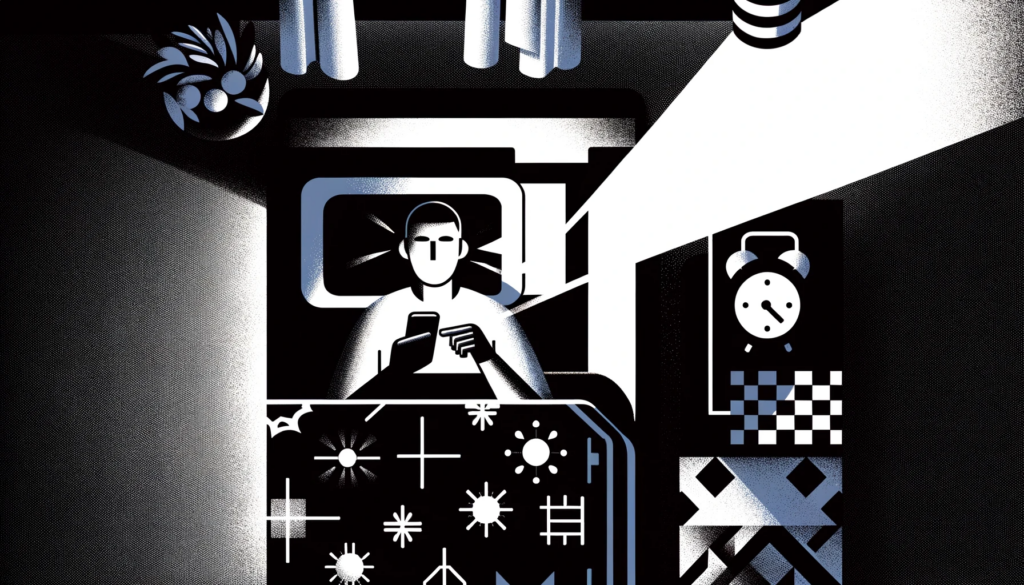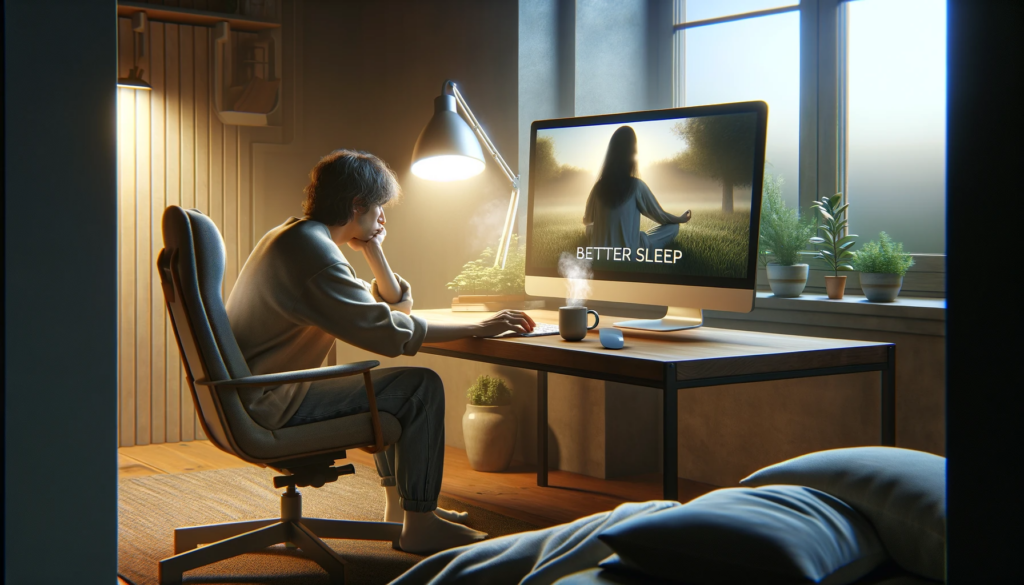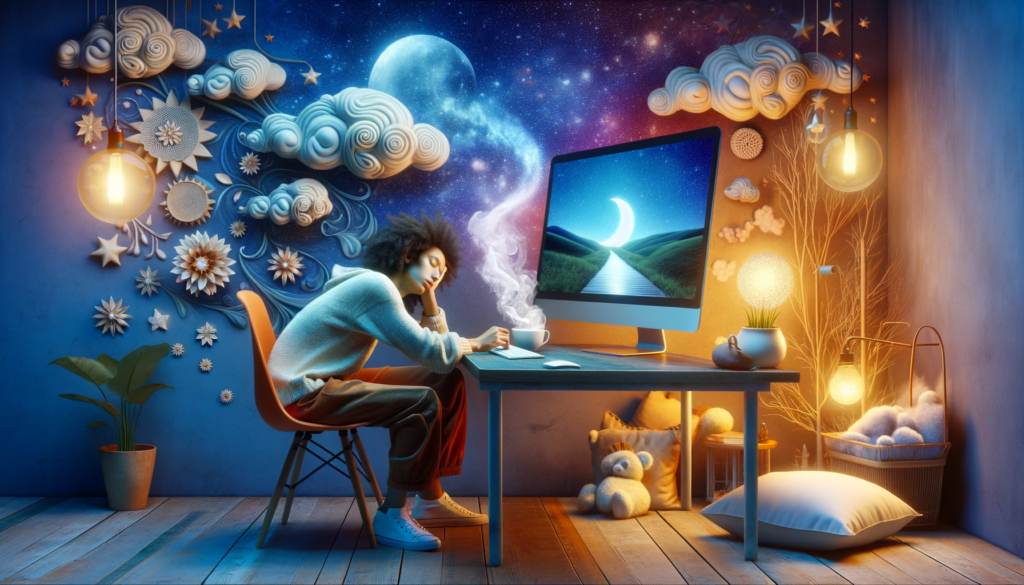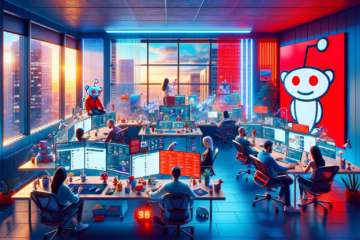Let’s talk about something we often code right out of our day – sleep. It’s the silent background app in our lives, crucial for debugging our brains after a day of tackling tech puzzles. Without it, we’re like smartphones with glitchy software – everything’s just a bit slower and more prone to crashing.
It’s time to reboot our sleep habits and get you sleeping like a log (and we don’t mean the error kind)!

I. Sleep 101 for Geeks
Sleep isn’t just a time-out from reality for busy, overworked IT professionals; it’s when your brain sorts and stores all those nifty programming tricks you’ve learned. Think of it as the ultimate defragmenter, tidying up your mental hard drive to keep it running smoothly.
We’re sure that after a day of putting out IT support fires emailed to you, or back-and-forth communication over issues escalated to you via the disorganized company chat–the exhausting signal-to-noise ratio you encounter throughout the day is very tiresome. And, whether you nap immediately after work, or feel so stressed that you don’t fall asleep until 3 am, the stressors from your job can send your natural body clock out of whack.
So for those who love to pull up the hood and understand the mechanics, know this – sleep is as vital to your cognitive functions as an overclocked CPU is to your gaming rig.
II. Screen Glow vs. Pillow Time
We get it, screens are our portals to the world, but they’re also the sneaky thieves of sleep.
Below are some ways that researchers from the National Sleep Foundation have found that phone and computer screens negatively impact our sleep:
- Light exposure within two hours of bedtime is disruptive to the human body’s circadian rhythm, which is our 24-hour cycle of hormones and chemicals that help direct us when to go to sleep versus being awake.
- The blue light emitted from phones, computers, and tablets causes us to be more awake and more alert. This is due to blue light having a shorter wavelength than other colors in the visible light spectrum, which contains light tones that are less jarring to the human eye.
- Because our circadian rhythm works together with natural daylight, casting a blue light at night tricks our brains into thinking it’s daytime, thus resisting sleep.
- Light exposure at night is a blocker of melatonin, the hormone that responds to night and makes you want to go to sleep.
So here’s a pro tip: dim the lights and switch off your devices an hour before bed. If you can’t, consider a blue light filter to keep your melatonin flowing right, for it’s the sweet sleep chemical.
III. Kicking Stress Out of Bed
Stress is the pesky bug in your bedtime code. Whether it’s the aftermath of server crashes or the dread of an impending deadline, it can keep your mind buzzing when it should be snoozing.
In case you’re underestimating the physiological effects of how stress and sleep relate to one another, here are some surprising ways the two correlate and ultimately impact your energy:
- High levels of stress impair your ability to fall asleep at a reasonable time, leading you to sleep longer and feel like you’re dragging behind as soon as you get up
- In a cruel cyclical twist of fate, a lack of sleep triggers even more sleep stress, keeping you stuck in an energy-lacking rut
- An inability to stop ruminating about stressors from the IT job maintains sleeplessness, which only just keeps you feeling stressed every day
- Getting the recommended 7-9 hours of sleep is difficult enough due to stress, and a hard cycle to break if you don’t proactively look at stress coping mechanisms

To combat this cycle, try some relaxation hacks like deep breathing, meditating, or even jotting down your worries in a notebook. Empty your brain cache so you can shut down stress and boot up sleep.
IV. Does Working Out Improve Sleep Quality?
We all know this, and somewhere in the back of our minds, we have a little gym goblin nagging us to get off our behinds and go for a walk at the very least. However, the power of habit is strong and simply moving from the chair to the couch, to the bed can be a healthy routine.
Break the cycle by deliberately refusing to use public transport or taxis and go for a longer walk instead at least once a week! This will not only improve your sleep but your productivity as well. After all, sitting in a chair all day can creep up on you over time and make your overall health decline.
Another antidote is to go for a massage. It will help you release tension in your muscles and get your blood flowing more easily, relaxing your body and mind.
V. Your Sleep Routine as a Techie: The Ultimate Cheat Code
Having a consistent sleep routine is like finding the ultimate answer key for rest.
Set a regular bedtime and wake-up call that syncs with your circadian rhythm, which is your body’s natural clock. Stick to this routine even on weekends. Yes, even after those late-night gaming binges.
VI. Your Pre-Sleep Game Plan
Create a pre-sleep ritual to tell your body it’s time to wind down.
This could be anything from reading a chapter of a book (not an e-book), listening to chill tunes, or sipping on some warm caffeine-free tea. Just like you’d run a shutdown sequence on your computer, do the same for your body.
Here are some examples of how you could budget your time to prime your body for a good night’s sleep:
| Manage Your Daily Schedule a Day in Advance | A good night’s sleep starts the night before. Be strategic about the next day. Write down a schedule for your day and the tasks you need to knock out so that you’re not scrambling to finish tasks in the nighttime. |
| Use Daily Reminders | Keep reminders or alarms on your phone or your computer apps to make sure you are adhering to your daily schedule and don’t fall too far off track. |
| Eat According to Schedule | To avoid having late dinners or staying up to order takeaway, make sure you don’t eat breakfast and lunch too late. That just pushes back when you eat dinner as a result. |
| Pre-Bed Prep | Set a daily alarm to go to bed on time and wake up on time. Maintain a daily hygiene routine to prime your brain for sleepy time (eg. showering, brushing your teeth, listening to calm music, or a soothing podcast). Dim the lights and turn off electrical devices an hour before bed. |
| Ready for Sleep | Turn off the TV and computers so that their glares don’t keep you awake. Make sure to turn off the lights and be present with your body as it naturally wants to fall asleep at night. |
VII. Midnight Snacks and Evening Eats: What’s In and What’s Out?
That late-night pizza might be calling, but your sleep is begging you to hang up.
Heavy, rich foods can rev your digestive system when you should be powering down. Opt for sleep-friendly snacks like bananas, almonds, or a warm glass of milk. They’re the upgrade your sleep software needs.
VIII. Tech That Tucks You In: Apps for Sleep
Yes, there’s tech out there that can actually help you sleep! From white noise machines that drown out the world to sleep-tracking apps that monitor your rest, there’s a whole market dedicated to getting you better sleep. Just remember, the goal is to use technology to improve your sleep, not to let it keep you up.

Here are a few apps that are designed to help improve sleep:
- Calm: This app offers a variety of guided meditations, sleep stories, and calming music designed to help reduce anxiety and improve the quality of sleep.
- Headspace: Known primarily for its meditation tools, Headspace also provides users with sleep meditations, music, and soundscapes to encourage a restful night.
- Sleep Cycle: An intelligent alarm clock that tracks your sleep patterns and wakes you up in your lightest sleep phase, which is the natural way to wake up feeling rested and relaxed.
- Noisli: A background noise and color generator ideal for working and relaxing. It also includes a sleep timer so you can drift off to the sounds of nature or ambient music.
- Slumber: Offers a mixture of experiences to help you fall asleep, whether it’s meditation-focused, a bedtime story, or the sound of a warm jacuzzi.
- Pzizz: Uses effective psychoacoustic principles to create beautiful dreamscapes that will help you drift off to sleep.
- Relax Melodies: This allows you to create your own mix of background sounds from a selection of beats, melodies, and nature sounds.
- Sleep as Android: Tracks your sleep and works as an alarm clock that can integrate with other smart home devices and wearables.
- 10% Happier: A meditation app designed for people who are skeptical of meditation, offering guidance and sleep meditations that help you wind down before bed.
- SleepTown: An interesting take on sleep apps, SleepTown lets you build a virtual town by achieving your sleep goals by incentivizing a regular sleep schedule.
Remember, while these apps can be very helpful, it’s important to maintain good overall sleep hygiene, which includes limiting screen time before bed, as the blue light emitted by screens can interfere with the body’s natural sleep-wake cycle.
IX Soothing Podcasts to Help You Sleep Better
From the witty Adult Swim’s “Joe Pera Talks You to Sleep for 10 Hours,” to the hilarious “Go the f* to Sleep,” read by the amazing Samuel L. Jackson, to unintentional ASMR, platforms like Spotify are full of podcasts that you can fall asleep to.
If you are on the lookout for a more serious soothing voice to lull you to sleep, we’ve got some meditation and sleep podcast treats for you here!
Level Up Your Sleep Game
All right, fellow tech warriors, it’s time to level up your sleep game. Think of it as the ultimate side quest, one that rewards you with sharper thinking, better health, and a more balanced life!
And who knows? With better sleep, you might just crack the code on that project you’ve been wrestling with.
Share Your Sleep Wins
We challenge you to try out these sleep tips and share your stories.
Did switching off early help you conquer the next day’s coding challenge? Did a gadget lull you into the best sleep ever?
Drop your experiences in the comments and let’s conquer the final boss of insomnia together!
Get Some $$$ without Sacrificing the ZZZ!
It’s time to ditch that after-hours shift that’s eating away at your sleep and will for life! At Support Adventure, you get to work shifts that support your sleep schedule, all while working remotely!
If you are into working for an MSP help desk, you should apply for a job with us. As a remote MSP staffing company, we have roles open for REMOTE IT help desk technicians (all tiers), service desk coordinators (dispatchers), and system administrators.



0 Comments